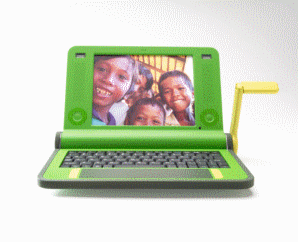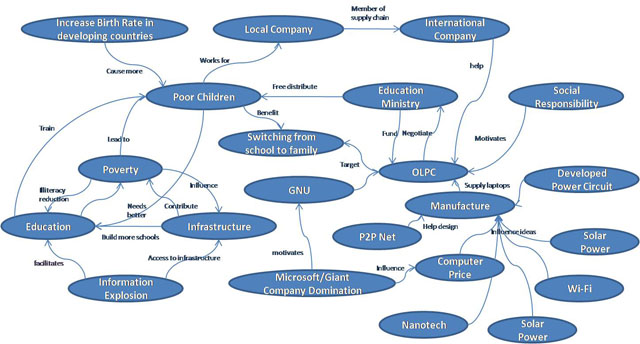Difference between revisions of "The future of the $100 laptop in 2017"
Lovelyxinxin (talk | contribs) |
|||
| (121 intermediate revisions by 5 users not shown) | |||
| Line 1: | Line 1: | ||
<div style="background-color:#ffff99"> | |||
=Introduction= | =Introduction= | ||
</div> | |||
<table align = "center" border = "0" width = "60%"> | |||
<tr> | |||
<td align = "center"> | |||
[[Image:Logo_100Laptop.jpg]] | |||
</td> | |||
</tr> | |||
</table> | |||
[[Image:Test_100Laptop.gif|frame|right]] The "$100 laptop" is a more popular name for a project set up by One Laptop per Child (OLPC) association. The $100 laptop was a result of research initiative by MIT Media Lab in January 2005 in its effort to create a technology that will revolutionise child education in the world. | |||
One Laptop per Child (OLPC) is a non-profit organisation that was established to achieve its goal. It is independent of MIT and is strongly sending the message to the world that this is not a laptop project but an education project. | |||
Children in rural areas--especialy in developing countries--have very little, if not deprived of, access to school. The conventional solution to this issue is to build a school and train teachers. But it is perhaps the slowest way. OLPC is a breakthrough that will give the rights to education to these children. | |||
At the end of November 2006, the $100 laptop was proudly presented to the public. Despite the price and the intended users, the machine boasts a remarkable complete sets of software that helps broaden the mind and creativity of a child. This was made possible by the strong support of open-source community in building this system so that the price can be kept low. | |||
Our research is to study the future of this education project in 2017 considering various driving forces from technological to socio-political aspects. The motivation behind this research choice is the noble and excellent idea of this project as well as the technology applications in it. | |||
Aki Baihaki, Sonny Nyeko, Jason Tsai, Wang Xin | |||
<div style="border-right: darkgray 1px solid; border-top: darkgray 1px solid;border-left:darkgray 1px solid;border-bottom: darkgray 1px solid;background-color: #ccff66;padding:2px"> | |||
=Research Questions= | |||
</div> | |||
Click here for our [[Our Research Questions|Complete list of our research questions]] | |||
<table border = "0" width = "80%"> | |||
<tr> | |||
<td> | |||
[[Image:OLPC_Questions.jpg |frame|left]] | |||
</td> | |||
<td> | |||
* [http://scenariothinking.org/wiki/index.php/Our_Research_Questions#Laptop Laptop Questions] | |||
* [http://scenariothinking.org/wiki/index.php/Our_Research_Questions Project Questions] | |||
* [http://scenariothinking.org/wiki/index.php/Our_Research_Questions Economic Questions] | |||
* [http://scenariothinking.org/wiki/index.php/Our_Research_Questions Social Questions] | |||
* [http://scenariothinking.org/wiki/index.php/Our_Research_Questions Demographic Questions] | |||
</td> | |||
</tr> | |||
</table> | |||
<div style="border-right: darkgray 1px solid; border-top: darkgray 1px solid;border-left:darkgray 1px solid;border-bottom: darkgray 1px solid;background-color: #b0e0e6;padding:2px"> | |||
=Driving Forces= | =Driving Forces= | ||
</div> | </div> | ||
*[[Political & Social Forces]] | |||
*[[Economic Forces]] | |||
*[[Science & Technology Forces]] | |||
*[[Resource & Environment Forces]] | |||
*[[Population & Demographic Forces]] | |||
<div | |||
<div style="border-right: darkgray 1px solid; border-top: darkgray 1px solid;border-left:darkgray 1px solid;border-bottom: darkgray 1px solid;background-color: #ffb6c1;padding:2px;filter:progid:DXImageTransform.Microsoft.Alpha(opacity=50);"> | |||
=Diagrams= | |||
</div> | </div> | ||
<div width = "80%"> | |||
[[Image:DriverForces_OLPC.jpg]] | |||
<div | |||
[ | |||
</div> | </div> | ||
</ | 1sBj45 <a href="http://rwmftbxmcksf.com/">rwmftbxmcksf</a>, [url=http://shahzennmlwo.com/]shahzennmlwo[/url], [link=http://kdrppgwpywjd.com/]kdrppgwpywjd[/link], http://azqsztdccaye.com/ | ||
= | =Frequently Asked Questions= | ||
[[Image:OLPC_FAQ.jpg|frame|right]] | |||
* [[Why do children in developing nations need laptops?]] | |||
* [[What is the alternative for education?]] | |||
* [[What is the $100 Laptop, really?]] | |||
* [[Is this project really about getting computers to kids?]] | |||
* [[Child is a nebulous term; what is the exact age range OLPC are targeting?]] | |||
= | BDL09T <a href="http://ktmkhpuxcczf.com/">ktmkhpuxcczf</a>, [url=http://kgufhmqgfqew.com/]kgufhmqgfqew[/url], [link=http://pkhdzhrjtzuv.com/]pkhdzhrjtzuv[/link], http://qzainatswcqk.com/ | ||
=Related Links= | |||
*[http://www.youtube.com/watch?v=f3m7f0WgWNM Our Video Presentation] | |||
*[http://www.laptop.org One Laptop per Child] | |||
*[http://www.media.mit.edu MIT Media Laboratory] | |||
*[http://wiki.laptop.org OLPC Wikipedia] | |||
*[http://www.dcontinuum.com/content/show.php?id=4 The Making of $100 Laptop] | |||
*[http://news.bbc.co.uk/2/hi/technology/6675833.stm '$100 laptop' sparks war of words] | |||
*[http://etech.eweek.com/content/desktops_and_notebooks/meet_the_xo.html Meet the XO] | |||
*[http://news.bbc.co.uk/2/hi/technology/6723741.stm Intel steps up cheap laptop race] | |||
*[http://etech.eweek.com/content/desktops_and_notebooks/meet_the_xo.html Intel not being a good classmate] | |||
*[http://news.bbc.co.uk/2/hi/technology/6189222.stm $100 laptop set for launch] | |||
*[http://news.bbc.co.uk/2/hi/technology/6246989.stm $100 laptop could sell to public] | |||
*[http://news.bbc.co.uk/2/hi/technology/6908946.stm '$100 laptop' production begins] | |||
*[http://news.bbc.co.uk/2/hi/technology/6897950.stm Intel and $100 laptop join forces] | |||
*[http://news.bbc.co.uk/2/hi/technology/6932897.stm Low-cost PC aims at rural China] | |||
*[http://news.bbc.co.uk/2/hi/technology/7082701.stm '$100 laptop' begins production] | |||
*[http://news.bbc.co.uk/2/hi/technology/7171201.stm One laptop project dealt big blow (Intel pulls out on project)] | |||
<hr /> | <hr /> | ||
<pagerating from="Bad" to="Good" category="Scenario">Rate this page</pagerating> | <pagerating from="Bad" to="Good" category="Scenario">Rate this page</pagerating> | ||
Latest revision as of 17:22, 10 March 2010
Introduction
|
|
The "$100 laptop" is a more popular name for a project set up by One Laptop per Child (OLPC) association. The $100 laptop was a result of research initiative by MIT Media Lab in January 2005 in its effort to create a technology that will revolutionise child education in the world.
One Laptop per Child (OLPC) is a non-profit organisation that was established to achieve its goal. It is independent of MIT and is strongly sending the message to the world that this is not a laptop project but an education project.
Children in rural areas--especialy in developing countries--have very little, if not deprived of, access to school. The conventional solution to this issue is to build a school and train teachers. But it is perhaps the slowest way. OLPC is a breakthrough that will give the rights to education to these children.
At the end of November 2006, the $100 laptop was proudly presented to the public. Despite the price and the intended users, the machine boasts a remarkable complete sets of software that helps broaden the mind and creativity of a child. This was made possible by the strong support of open-source community in building this system so that the price can be kept low.
Our research is to study the future of this education project in 2017 considering various driving forces from technological to socio-political aspects. The motivation behind this research choice is the noble and excellent idea of this project as well as the technology applications in it.
Aki Baihaki, Sonny Nyeko, Jason Tsai, Wang Xin
Research Questions
Click here for our Complete list of our research questions
Driving Forces
- Political & Social Forces
- Economic Forces
- Science & Technology Forces
- Resource & Environment Forces
- Population & Demographic Forces
Diagrams
1sBj45 <a href="http://rwmftbxmcksf.com/">rwmftbxmcksf</a>, [url=http://shahzennmlwo.com/]shahzennmlwo[/url], [link=http://kdrppgwpywjd.com/]kdrppgwpywjd[/link], http://azqsztdccaye.com/
Frequently Asked Questions
BDL09T <a href="http://ktmkhpuxcczf.com/">ktmkhpuxcczf</a>, [url=http://kgufhmqgfqew.com/]kgufhmqgfqew[/url], [link=http://pkhdzhrjtzuv.com/]pkhdzhrjtzuv[/link], http://qzainatswcqk.com/
Related Links
- Our Video Presentation
- One Laptop per Child
- MIT Media Laboratory
- OLPC Wikipedia
- The Making of $100 Laptop
- '$100 laptop' sparks war of words
- Meet the XO
- Intel steps up cheap laptop race
- Intel not being a good classmate
- $100 laptop set for launch
- $100 laptop could sell to public
- '$100 laptop' production begins
- Intel and $100 laptop join forces
- Low-cost PC aims at rural China
- '$100 laptop' begins production
- One laptop project dealt big blow (Intel pulls out on project)
<pagerating from="Bad" to="Good" category="Scenario">Rate this page</pagerating>




